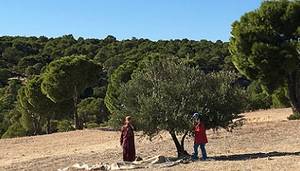Climate change
 In the face of climate change, the Voluntary Guidelines call for legitimate tenure rights to be respected and protected.
In the face of climate change, the Voluntary Guidelines call for legitimate tenure rights to be respected and protected.
Individuals and communities who hold legitimate tenure rights should be able to participate in the implementation of climate change mitigation and adaptation programmes consistent with the principles of consultation and participation of the Voluntary Guidelines.
A number of countries are identifying strategies to address tenure issues to meet obligations established under the 2015 Paris Agreement, Nationally Determined Contributions, the Sustainable Development Goals and other international obligations. The Voluntary Guidelines are serving as the basis for informing and guiding work on tenure in the context of REDD+. REDD+ stands for countries' efforts to reduce emissions from deforestation and forest degradation, and foster conservation, sustainable management of forests, and enhancement of forest carbon stocks.
Benin
 Benin completed an analysis of the forest sector policy and legal framework and a review of the tenure regime in the context of REDD+. These assessments assisted Benin to independently draft its REDD+ Readiness Preparation Proposal. Benin also completed a draft of a new forest law that integrates REDD+ and tenure concerns. Regional consultations and a national validation workshop were held to finalize the document.
Benin completed an analysis of the forest sector policy and legal framework and a review of the tenure regime in the context of REDD+. These assessments assisted Benin to independently draft its REDD+ Readiness Preparation Proposal. Benin also completed a draft of a new forest law that integrates REDD+ and tenure concerns. Regional consultations and a national validation workshop were held to finalize the document.
Sri Lanka
 In Sri Lanka an assessment was carried out using criteria from the Voluntary Guidelines to analyze the tenure implications for proposed Policies and Measures (PAMs) to address deforestation and forest degradation. Some PAMs were found to have implications on tenure, for example, actions to prevent forest encroachment and improvements in coordinating land use planning.
In Sri Lanka an assessment was carried out using criteria from the Voluntary Guidelines to analyze the tenure implications for proposed Policies and Measures (PAMs) to address deforestation and forest degradation. Some PAMs were found to have implications on tenure, for example, actions to prevent forest encroachment and improvements in coordinating land use planning.
Tunisia
 Tunisia’s forests, while relatively small in terms of land cover, are a vital source of livelihoods for close to 1 million inhabitants and provide important hydrological functions and biodiversity benefits. Policymakers, technical government staff, civil society, researchers and others collaborated in developing a strategy to manage these remaining forests sustainably, within the framework of REDD+. The strategy was based on the recommendations of analyses supported by UN-REDD.
Tunisia’s forests, while relatively small in terms of land cover, are a vital source of livelihoods for close to 1 million inhabitants and provide important hydrological functions and biodiversity benefits. Policymakers, technical government staff, civil society, researchers and others collaborated in developing a strategy to manage these remaining forests sustainably, within the framework of REDD+. The strategy was based on the recommendations of analyses supported by UN-REDD.
For further information on Tunisia’s progress with REDD+: Radio Oxygene (Arabic) and the Tunisia REDD+ Facebook group.
By making forests more valuable standing than cut down, REDD+ supports forest communities and developing countries with a sustainable, low-carbon pathway to economic growth. The responsible governance of tenure is needed for REDD+ to succeed but the two are mutually reinforcing since REDD+ can provide the impetus for multi-stakeholder collaboration and draws attention to issues related to tenure.
